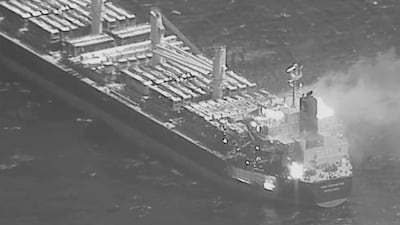The UN Security Council on Thursday demanded again that Yemen's Houthi rebels stop all attacks on ships in the Red Sea, extending the requirement that UN Secretary General Antonio Guterres report monthly on incidents.
The resolution received 12 votes in favour and three abstentions, from Russia, China and Algeria.
A follow-up to the resolution adopted in January, the measure comes as the Iran-backed Houthis continue to threaten maritime traffic in the Red Sea, the Gulf of Aden and the broader Indian Ocean, despite sustained US-led retaliatory strikes in Yemen.
The council repeated its demand that the group immediately cease all attacks against merchant and commercial ships, and release the Galaxy Leader and its crew.
The Galaxy Leader is a Japanese-operated vessel affiliated with an Israeli businessman. The Iran-backed Houthis seized the ship in November.
The rebels have launched missiles and drones at more than 60 ships. The attacks have killed four sailors and sunk two vessels so far.
The Houthis maintain that their attacks are focused on ships linked to Israel, the US and the UK, and are being carried out in solidarity with Palestinians amid the war in Gaza.
But many of the ships attacked have little or no connection to the conflict, with some of them even bound for Iran.
Many vessels have since opted to avoid the Red Sea route to the Suez Canal, taking the longer journey around the southern tip of Africa instead.
The Security Council text emphasises the need to address the root causes, including “the conflicts contributing to regional tensions and the disruption of maritime security in order to ensure a prompt, efficient and effective response”.
Robert Wood, US deputy ambassador to the UN, condemned the continuous attacks on ships in the Red Sea, and those countries supplying weapons for the assaults.
“The threat to navigational rights and freedoms in the Red Sea is a global challenge and necessitates a global response,” Mr Wood said.
He said that extending Mr Guterres's reporting period to January 2025 will help to ensure that the Security Council has “accurate and timely information to inform its deliberations over how to best address Houthi actions”.
Russia expressed support for Red Sea shipping access but pointed out “flaws” in the US-Japanese resolution in its application of international law.
Houthi attacks must end but retributive strikes must also stop, Russia’s deputy UN ambassador Anna Evstigneeva stressed.
“We urge all participants in the coalition to immediately halt illegal attacks and to transition to political and diplomatic means to reduce tensions in the waters adjacent to Yemen,” she said.
Ms Evstigneeva reminded council members that achieving normalisation in the Red Sea region cannot occur without first securing a ceasefire in the conflict between Israel and Hamas.
Without including this, she said, the resolution remains “divorced from reality, to put it mildly”.
China also shared its concern over actions taken unilaterally by some states and rejected “misuses of international law” by any country.
“Our main concern was that that resolution's ambiguity on some key elements could have negative consequences and lead to further escalation of regional tensions,” said Beijing's deputy ambassador Geng Shuang.
Mr Geng called on all parties concerned to avoid “misinterpretation and misuse” of international law and council resolutions.









